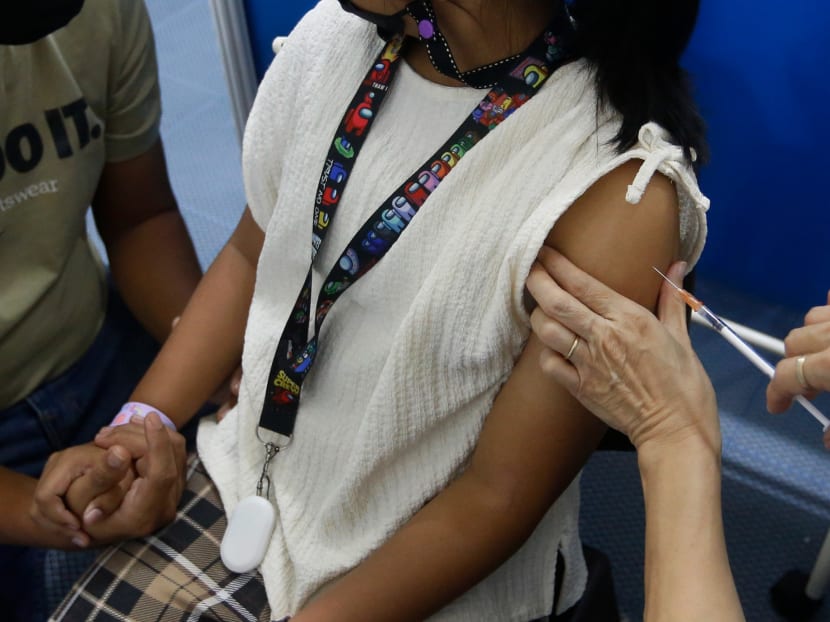KKH's Covid-19 study finds high antibody levels in children after they received 2 vaccine doses
SINGAPORE — Interim analysis of the Covid-19 vaccination trial on children aged between 5 and 11 at KK Women’s and Children’s Hospital (KKH) found that those who received pediatric doses of the Pfizer-BioNTech/Comirnaty developed high antibody levels.

- Associate Professor Kenneth Mak said that children in a KKH study developed 64 per cent antibody level after a first dose of the Pfizer-BioNTech vaccine
- This increased to 96 per cent after their second dose, which was taken 21 days later, said the Ministry of Health's director of medical services
- There were some reported reactions to the vaccines during the trial but they were all minor
SINGAPORE — Interim analysis of the Covid-19 vaccination trial on children aged between five and 11 at KK Women’s and Children’s Hospital (KKH) found that those who received paediatric doses of the Pfizer-BioNTech (Comirnaty) vaccine developed high antibody levels.
Associate Professor Kenneth Mak, director of medical services at the Ministry of Health (MOH), said at a press conference on Friday (Jan 21) that the first cohort of 50 children developed 64 per cent antibody level after the first dose of the vaccine.
This increased to 96 per cent after their second dose, which was taken 21 days later.
KKH announced last November that it would be studying 150 children in Singapore to assess how they respond to Covid-19 vaccines, in a bid to shape public health vaccination policies and protect the young ones against the infectious disease.
Assoc Prof Mak, who is part of the Government's Covid-19 task force, said that there were some reported reactions to the vaccines during the trial but they were all minor.
The reactions included pain at the injection site, body aches, fever and minor allergic reactions.
“None of the children needed medical consultation or hospitalisation due to these reactions. And most of these reactions resolved within a few days,” he said.
Assoc Prof Mak added that the reactions were much lower in this age group than in older adolescents, who received a higher dose of the Pfizer-BioNTech vaccine.
The Health Sciences Authority earlier this week said that there were six reported cases of "non-serious" side effects due to Covid-19 vaccination among children aged five to 11, out of 20,327 doses administered as of Dec 31 last year.
The six comprised three cases of allergic reactions — namely hives and swelling of the eyelids, face and lips — and one case each of dizziness, fever and fast breathing.
Assoc Prof Mak pointed out that there have been no reports of serious side effects occurring after vaccination among children aged five to 11.
In particular, there were no reports of myocarditis or pericarditis, inflammatory conditions that affect the heart, since the start of the programme for these children.
“So we're seeing that the lower-dose formulations for the Pfizer-BioNTech vaccine that we're using are safe,” he said, adding that this correlates with experience internationally such as in the United States, where more than nine million doses have been given to children.
“The rate of severe infection in children or having a severe complication after Covid-19 is not trivial. It's important for us to note that while infections in children are generally less severe than in adults, infections are not mildAssociate Professor Kenneth Mak, director of medical services at the Ministry of Health”
Giving an update on infections among children under the age of 12 here, Assoc Prof Mak said that the number had more than doubled from 120 cases reported on Jan 13 to 312 cases on Thursday.
As of Thursday, Singapore had more than 1,500 cases of unvaccinated children below the age of 12 who had active coronavirus infections.
Although a majority of these children are recovering at home, 43 have been admitted into hospitals and Covid-19 treatment facilities.
“Our children in this age group are starting to form the majority of cases admitted into hospitals for care,” Assoc Prof Mak said.
Both KKH and the National University Hospital reported more cases of respiratory symptoms among children requiring admissions into the hospitals. These are those with Covid-19 and other illnesses.
Assoc Prof Mak said that the Omicron coronavirus strain tends to affect the upper respiratory tract in infected people and children who are especially very sensitive to inflammation in this area, which can cause wheezing and breathlessness.
It is therefore important to get children vaccinated given the surge in Omicron cases, he stressed.
“The rate of severe infection in children or having a severe complication after Covid-19 is not trivial. And it's important for us to note that while infections in children are generally less severe than in adults, infections are not mild.”











